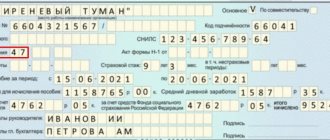Why get a certificate
The certificate is the only document certifying the heir's rights to the property that he received by inheritance.
Although there is no obligation to receive the document, without it it will not be possible to re-register property rights, therefore, obstacles will arise to the exercise of the owner’s rights. For example, in relation to property, the ownership of which requires registration with Rosreestr and other registration authorities.
We are talking, first of all, about real estate and vehicles. If these objects are included in the estate, obtaining a certificate is in the interests of the heir.
In the absence of such objects, this document is not required, but can also be issued.
General documents for a notary during inheritance
To obtain a certificate from a notary about entering into an inheritance, you will need the following list of documents.
The main list includes documents confirming the identity of the applying heir (passport, other identity card), the fact of the death of the testator, his place of residence before death (place of opening of the inheritance), and the basis of inheritance. An inheritance case is opened in any notary office located in the area where the deceased was registered.
The fact of death confirms:
- registry office certificate of the death of the testator;
- a court decision declaring a person dead;
- a certificate issued by an authorized body of another state;
- information from the Civil Registry Office Register.
The death certificate is issued in a single copy and issued by the civil registry office to the person who submitted the medical certificate of death of the citizen. As a rule, it is owned by one heir, but there may be several. In the absence of this document, to register the inheritance, the notary has the right to make a request to the civil registration authorities and receive an extract from the register of death deeds.
The place of opening of the inheritance is established on the basis of the following documents:
- a certificate from the Ministry of Internal Affairs, management company, HOA about the place of registration of the testator;
- a document confirming the location of the inherited property on the territory of the Russian Federation, if the deceased citizen lived abroad;
- court decision, in the absence of permanent (temporary) registration.
Grounds for inheritance
- Inheritance by will. For a notary, this is the main document confirming the rights of the heirs. If the will was closed, a certified protocol of its opening is submitted to the notary's office. The will exists in a single copy, and for various reasons it may not be presented to the notary, and sometimes it is deliberately hidden for selfish interests.
A potential successor who has reason to believe that a will has been drawn up can contact any notary office in the Russian Federation with a request to find out this fact. The notary checks the electronic database of the notary's EIS and informs the applicant about the presence (absence) of a will and the address of the notary office in which it is stored.
- Documents for inheritance by law. In the absence of a will, the property of the deceased is inherited by the relatives of the conscript line (there are eight of them in total). In this case, you need to submit documents about kinship or marriage (the spouse is included first of all as heirs). These include birth, marriage, divorce and last name change certificates, adoption documents and others.
- Inheritance agreement. A new basis for receiving an inheritance, which has appeared in Russian legislation since 2021. This is a lifetime transaction made between a citizen and his potential heir, providing for the receipt of an inheritance in exchange for the fulfillment of certain obligations. Most often, this is an apartment inheritance agreement with the condition of lifelong maintenance of the future testator.
Who can I get a certificate from?
Before the death of loved ones, the need for such a document does not arise, so not everyone knows who has the right to issue a certificate of inheritance.
These powers are vested in notaries, as well as officials who have the right to perform notarial acts:
- representatives of consular offices;
- heads of local administrations of districts, settlements, municipalities and other settlements where there is no notary.
But most often it is still the notary who opened the inheritance case.
The notary refuses to issue the document
When contacting a notary, you need to prepare the relevant documents. If the applicant cannot prove a family connection with the deceased person or refuses to pay state fees, then he will be refused acceptance of the application and issuance of a certificate. Of course, you can appeal the actions of a notary in court. But there must be good reasons. The courts do not always satisfy the demands of the plaintiffs.
If the notary’s actions are obviously illegal, then a court hearing must be initiated. Otherwise, you may be left without an inheritance. You also need to file a claim if the 6-month deadline is missed. For example, if the property is actually accepted.
If the heir turned to the wrong notary, is incapacitated or a 2nd line relative, if there are 1st line applicants, then there is no point in appealing the notary’s refusal. He is completely legitimate.
Conditions for issuing a certificate
If there are grounds for obtaining inherited property, the successor turns to a notary. He is obliged to check compliance with the list of conditions for issuing a certificate.
When deciding whether a notary can issue a certificate of the right to inheritance, he is guided by Art. 72 or art. 73 Fundamentals of the legislation of the Russian Federation on notaries, depending on the basis on which the successors have the right to the property of the deceased.
Let us recall that, according to Art. 1111 of the Civil Code of the Russian Federation, they can be a law or a will.
When inheriting by law
The burden of proving their inheritance rights lies with the heirs themselves. Before receiving a certificate of inheritance, they need to prepare a number of arguments.
According to Art. 72 of the Fundamentals of the legislation of the Russian Federation on notaries, such evidence should primarily concern:
- death of the testator;
- time and place of opening of the inheritance;
- the presence of kinship or other grounds for obtaining the status of an heir;
- the volume of the hereditary mass and its location.
The basis for issuing a certificate to successors who are deprived of the opportunity to prove the existence of rights to receive inherited property may be the consent of other successors who were able to prove it.
Such consent is provided to the notary in writing. However, this is only possible within the framework of the legal inheritance process. You can learn more about this from the publication “Inheritance by Law.”
When inheriting by will
The fact of drawing up a will does not fundamentally affect the procedure for obtaining a certificate from the notary who opened the inheritance, but it does introduce additional requirements. As with inheritance by law, the notary is obliged to check a number of facts relating to the priority inheritance issues indicated above.
The conditions for issuing a certificate of the right to inheritance under a will differ only in that, according to Art. 73 Fundamentals, instead of checking kinship or other relationships, the notary checks the existence of a will.
In addition, in accordance with clause 34 of the Methodological Recommendations for Performing Notarial Actions, approved by Order of the Ministry of Justice of the Russian Federation No. 91 of March 15, 2000, it is checked whether the will has been canceled.
In order to respect the legal rights of other heirs, the circle of persons claiming the obligatory share must be clarified. More information about this and other processes can be found in the article “Inheritance by will.”
Disposal of inheritance on the basis of a certificate
Often, heirs are faced with the fact that after registering property in their name, difficulties arise in managing and using it. The fact is that the testator could distribute the shares of each heir in the will, or bequeath the entire property to several persons without designating shares.
The following situations are possible:
- if the shares are determined during inheritance, then the property passes to the legal successors as shared ownership. Everyone has the right to dispose of their share at their own discretion;
- if parts of the property are not determined, then the property becomes joint ownership. It can be disposed of with the consent of all co-owners.
The heir has the right to sell, donate, exchange, lease, or pledge his part. However, there are some nuances. In case of shared ownership, the sale of a share of the property is possible subject to the rule of pre-emption . This means that the first thing you need to do is offer to buy it out to the co-owners. If none of them wants to buy a part, then it can be sold to others.
If the property is owned by joint ownership, then all transactions are made with the consent of all co-owners . If only one heir was indicated in the will, then he alone inherits and disposes of everything that remains after the deceased.
Actions of heirs after receiving a certificate of will
When a certificate of the right to inheritance under a will has been received, what the heirs should do next is determined depending on the type of property. It is also necessary to observe the order of inheritance of certain types of property.
Real estate
In accordance with Art. 131 of the Civil Code, the transfer of ownership of real estate to another person must be registered. The body that carries out registration is Rosreestr. The procedure involves entering information about the new owner into the electronic register.
Vehicles
In accordance with clause 4 of the General Provisions of Order of the Ministry of Internal Affairs No. 1001, when changing ownership, vehicles must be re-registered within 10 days. The relevant information is entered into the traffic police register.
Cash deposits, securities
After issuing a certificate of inheritance under a will, you must contact the bank where the deposit is kept or an account is opened in the name of the testator. It is enough to present this document for a bank employee to issue funds.
Please also note that after issuing a certificate of the right to inheritance under a will, the notary will send information to the tax authorities. This information is sent to government agencies no later than 5 days from the date of issuance of the title document.
Place of receipt of the certificate
Not every notary or official is able to issue one or another successor a document confirming their inheritance rights. Such powers are divided between them on a territorial basis, tied directly to the testator himself.
According to Art. 1162 of the Civil Code, a certificate of the right to inheritance is issued at the place of opening of the inheritance, which is considered to be the last place of residence or stay of the deceased (Article 1115 of the Civil Code).
Not any notary of the notarial district can do this, but only the one who opened the inheritance case. More than one case cannot be opened for one open inheritance.
To confirm the place of opening of the inheritance, the successors present to the notary a certificate of registration of the deceased at his place of residence, issued by the migration service departments or the local administration.
If the place of residence is unknown or is located outside the Russian Federation, then where to get a certificate of the right to inheritance is determined by the place where the deceased’s inherited property or its most valuable part is identified, determined based on market value.
Conditions of receipt
The certificate is issued 6 months after the death of an individual. The recipients of the document are close relatives of the deceased citizen and third parties. It all depends on the method of inheritance.
For example, applicants under a will may be close relatives, friends, acquaintances or a legal entity. You can also bequeath your assets to the state. If the inheritance of property is carried out according to a will, then the notary checks the composition of the citizens who are entitled to an obligatory part of the inheritance.
Inheritance by law implies the transfer of rights within the framework of priority. Close relatives – husband/wife, children/parents – have priority rights. The exception is heirs by representation. Here there is a forced shift in the usual order. For example, if the main heir dies before the testator, then the descendants of the deceased applicant take over the property.
Procedure for issuing a certificate
Documentation of the inheritance rights of successors is impossible without their participation - the law requires the heir to contact a notary. According to Art. 1162 of the Civil Code, a certificate of accession to inheritance rights is issued upon application of the successors.
It should contain information about:
- the notary and the office to which the application is submitted;
- deceased (personal details);
- applicant-successor: personal data, nature of family ties, and so on;
- property included in the inheritance mass;
- other facts and circumstances at the request of the notary.
Submission of such an application, in accordance with Art. 1153 of the Civil Code is one of the ways to accept an inheritance. However, a certificate of right to inheritance is issued to heirs only in this order.
After receiving the application, the notary checks the sufficiency of the conditions for issuing a certificate, defined in Art. 72 or 73 Fundamentals of legislation on notaries.
Application for acceptance of inheritance
Filing an application for acceptance of an inheritance is also one of the ways to acquire an inheritance, but it does not require the mandatory production of a certificate.
The method is suitable only for those successors who actually accepted the inherited property, the ownership of which does not require registration of the transfer of rights.
The application is submitted in a similar manner and contains similar information.
Preparation of documents to confirm inheritance rights
The application is not the only document submitted by legal successors to the notary when entering into an inheritance. At a minimum, they need to prepare a package of documents confirming the existence of the conditions enshrined in Art. 72 or 73 Basic.
The result of the event will depend on the completeness of this package, and without them the notary will refuse to register the inheritance.
The specific documents required to obtain a certificate of inheritance rights should be obtained directly from the notary: in each case the package will be individual.
Documents for inheritance
To formalize their inheritance rights, successors must first submit the following documents:
- death certificate or other document confirming the death of the testator, for example, a court decision;
- marriage certificate, birth certificate, certificate of family composition and other evidence of kinship or other relationships giving rise to the right of inheritance;
- title documents of the testator;
- report on the valuation of inherited property;
- passport or other identification documents of the successor;
- application of the legal successor for the issuance of a certificate.
State fee (notary fee)
When a certificate of inheritance is issued, the successors have an obligation to pay the notarial fee defined in Art. 333.24 of the Tax Code of the Russian Federation and made dependent on the degree of relationship. Yes, for:
- for legal successors of the first and second priority (with the exception of grandparents) the state duty is 0.3% of the value of the inherited property. The amount of the duty is limited to 100 thousand rubles;
- for other legal successors, the state duty is 0.6% of the value of the inherited property. The duty amount is limited to 1 million rubles.

When calculating the value of an inheritance, both market valuation and cadastral or inventory value can be taken into account.
In addition, tax legislation provides for a number of benefits that reduce the amount of duty or exempt from payment. You can learn more about this from the material “State Duty”.
Document issue deadline
To comply with the legality and inheritance rights of all successors, the legislation defines deadlines before which the certificate cannot be issued.
According to Part 1 of Art. 1163 of the Civil Code, they are 6 months. Their countdown begins from the moment the inheritance is opened. Thus, in general cases, a certificate is issued after the expiration of the six-month period for accepting an inheritance, specified in Art. 1154 Civil Code. True, only in the absence of obstacles, in particular, legal proceedings.
The law does not exclude the possibility of issuing a certificate before the end of the specified period. According to Part 2 of Art. 1163 of the Civil Code, the basis for this may be information about the absence of successors other than those who have already contacted the notary.
In addition, the law also defines cases when the procedure and timing for issuing a certificate can be changed, in particular if:
- the successor conceived during the life of the deceased did not have time to be born six months after the opening of the hereditary estate;
- the court decided to suspend the procedure for issuing a document regardless of the reasons;
- the court is considering a dispute about shares in the inheritance, about the circle of heirs, a case about restoring the deadlines for entering into inheritance rights, and so on.
If any of these grounds exist, the period during which a certificate of inheritance is issued is subject to suspension until they are eliminated.
Obtaining a certificate
If the above conditions are met, the deadlines provided by law have expired, there are no controversial issues and the state duty established by law has been paid, the document is issued to the successors who have applied to the notary at any time convenient for them.
As a rule, all materials for its preparation are prepared for the notary in advance, so the procedure for preparing and obtaining a certificate takes only a few hours.
Specific terms of production and receipt should be discussed with the notary involved in inheritance records.
Are there specific deadlines for applying for a certificate?
An heir who intends to inherit may not receive a certificate of his right to this property. In other words, receiving this document is not an obligation; there is no clear time frame for this process. Even after the expiration of the 6-month period for accepting the inheritance, a citizen has the right to contact a notary with an application to issue him the appropriate certificate. The absence of time limits is stated in Art. 1154 of the Civil Code of the Russian Federation.
A certificate, which confirms a citizen’s right to inheritance, can be obtained by all heirs. We are talking about those cases when inheritance occurs by several persons (children of a deceased parent, for example).
If the notary who opened the inheritance has ascertained that there are no possible claimants to the testator’s property, he has the right to issue certificates of their rights to citizens who apply to him ahead of schedule (based on clause 2 of Article 1163 of the Civil Code of Russia). But at the same time, the issuance of a certificate is suspended in the following situations:
- there is a corresponding court ruling;
- the potential heir has already been conceived, but not yet born.
Document validity period
Despite the prevailing stereotype, the certificate does not have a statutory period during which it is valid and can be presented at the place of request.
A certificate of inheritance is a perpetual document, the validity of which is not tied to time, so it can be used at any time before the death of the successor indicated in it.
As a rule, it is used to register rights to transferred property, but other uses are also possible.
Grounds for suspension of extradition
The notary is authorized to suspend the performance of a notarial act for various reasons - claims have been received from the testator's creditors, legal proceedings have been initiated, or there is information about a conceived but unborn child of a deceased citizen.
Expert opinion
Noskov Georgy
Lawyer. Experience 12 years. Specialization: civil, family, inheritance law.
Any heir can file a claim. For example, a claimant to property wants to challenge a will that excluded him from inheritance. Consequently, if the notary becomes aware of the start of the court hearing, he issues a decision to suspend the issuance of documents. It is valid until the hearing of the case is completed and a court decision is made. If the court rejects the claims, the notary continues the procedure for issuing documents to the heirs.
Sometimes a ban on continuing to perform notarial acts serves as an interim measure in claims for debt collection from heirs. It is also valid until a court decision is made.
If the applicant intends to go to court, he can write an application to suspend notarial actions. On its basis, the notary is obliged to suspend the procedure for up to 10 days (Article 41 of the Law on Notaries). If during this time the court does not receive confirmation of the commencement of proceedings on the heir’s claim, the notary continues to issue documents.
Number of copies
The number of copies of the certificate is determined by the legal successors themselves, based on the composition of the heirs. So, according to Art. 1162 of the Civil Code, at their will, the document can be issued either in a single copy - for all heirs together, or in multiple copies - for each of the applicants separately.
In addition, it can be issued both for the entire inheritance mass and for each individual part in it.
If, after completing all the documents and issuing certificates, other property is discovered that is not covered by the documents, an additional certificate of inheritance is issued. It may indicate not only the discovered property of the deceased, but also the heirs who missed the deadline for receiving the inheritance.
According to Art. 71 Fundamentals, this will require the consent of everyone who has already accepted the inherited property.

Is it necessary to receive it?
Acceptance of the testator's property is not the responsibility of the relatives. They may refuse assets or assign them to other applicants. Typically, a waiver application is submitted if a deceased citizen left a significant amount of debt.
For example, during his lifetime a person took out a consumer loan or took out a mortgage. If the amount of the debt exceeds the value of the remaining property, then accepting it is inappropriate for the heirs.
But sometimes applicants waive their rights due to reluctance to contact creditors.
Refusal to issue a certificate
Despite the extensive law enforcement practice, transparent procedure and accessibility of legislation, we often hear about cases where a notary refuses to issue a certificate of inheritance.
Art. 48 Fundamentals of Notary Legislation identifies 7 grounds on which a refusal can be made. All of them boil down to non-compliance with the conditions for issuance, non-compliance of documents with legal requirements, contacting the wrong notary or application by a person who does not have the authority to apply.
If the grounds specified in the article exist, the refusal should be considered legal. If a notary does not issue a certificate for other reasons, his actions can be appealed in court.
Upon receipt of a refusal, the successor has the right to request from the notary not only an explanation of the procedure for appealing his actions, but also a written statement of the reasons for the refusal. The notary is obliged, no later than 10 days from the date of application, to issue a resolution refusing to issue a certificate of inheritance.
Having received a document with a written justification for the refusal, the heir goes to court to appeal the refusal to perform notarial acts, if the refusal, in the opinion of the applicant, is not justified.
According to Art. 49 Fundamentals, for this it is necessary to file a complaint with the district court at the location of the notary within 10 days from the date of receipt of the refusal, which is submitted along with the decision.
If the applicant manages to prove that the official’s claims are unfounded, the notary’s refusal to issue a certificate of inheritance will be canceled by an appropriate court decision, which will entail legal consequences.
According to Art. 312 of the Code of Civil Procedure, a court decision that satisfies the applicant’s complaint against the notary’s refusal decision automatically obliges him to perform notarial acts, which the official refused to perform. Simply put, the notary will have to inform you that such a certificate of inheritance, which he previously refused to issue, will still be issued.
In addition, according to Art. 34 of the Fundamentals, control over the activities of private notaries is exercised by notary chambers and territorial bodies of the Ministry of Justice (for state ones). As a result of filing a complaint with these authorities, the notary may be subject to disciplinary action.
What data and documents does the notary not have the right to demand from the heirs?
The notary is required to request some information on his own. For example, about encumbering the cadastral value of real estate.
Information that the notary independently requests about real estate.
According to Article 47.1 of the “Fundamentals of the Legislation of the Russian Federation on Notaries”, in cases where information contained in the Unified State Register of Real Estate is required to perform a notarial act, notaries have no right to demand the provision of such information from a citizen, his representative or a representative of a legal entity who has applied for this notarial act. faces.
To perform this notarial act, a notary in the manner and methods established by Federal Law of July 13, 2015 N 218-FZ “On State Registration of Real Estate”, within three working days from the date of application of a citizen, his representative or representative of a legal entity, requests and receives within the time limits established by the specified federal law, the information contained in the Unified State Register of Real Estate is provided to the rights registration authority.
From the Unified State Register of Real Estate the notary requests:
- information about the rights of the testator to real estate objects, information about the recognition of the copyright holder as incompetent or partially capable, generalized information about the rights of the testator to real estate objects available to him in connection with the opening of an inheritance;
- information about the rights to real estate objects, information about the recognition of the copyright holder as incompetent or partially capable and (or) copies of title documents in connection with the request for information and documents necessary to perform a notarial act, including information about the rights of the mortgagee to the subject of mortgage and (or ) copies of title documents, information about the content of title documents in connection with the notary’s verification of the conditions for making an executive inscription.”
In addition, in accordance with the norms of subparagraphs 5, 8 of paragraph 1 of Article 333.25 of the Tax Code of the Russian Federation, when calculating the amount of the state duty for issuing certificates of the right to inheritance, the value of the inherited property is taken, determined in accordance with subparagraphs 7 - 10 of paragraph 1 of Article 333.25 of the Tax Code of the Russian Federation. The cost can be determined by appraisers, legal entities who have the right to enter into an agreement to conduct an appraisal in accordance with the legislation of the Russian Federation on appraisal activities, or by organizations (bodies) for recording real estate objects at their location. issued by the persons specified in subparagraphs 7-10 of this paragraph, may be submitted to calculate the state duty Notaries and officials performing notarial acts do not have the right to determine the type of property value (valuation method) for the purpose of calculating state duty and require the payer to submit a document confirming this type of property value (valuation method).
If cadastral registration of real estate has been carried out, it is possible to calculate the notary tariff using the cadastral valuation. The provisions of Article 47.1 of the Fundamentals of the Legislation of the Russian Federation on notaries oblige the notary to independently request and receive, within the time limits established by the federal law, from the rights registration authority, the information contained in the Unified State Register of Real Estate. The notary has no right to demand the provision of such information from a citizen or his representative applying for this notarial act.
Taking into account the above provisions of the current legislation, in order to calculate the notary fee, the notary is obliged to independently request information about the cadastral value of the inherited property.
Other information that the notary requests independently.
Information about encumbrances, seizures of inherited property in relation to movable property (vehicles) - based on information from the register of notifications of pledge of movable property in the UIS. The notary receives information about encumbrances on securities from legal entities authorized to take into account encumbrances on securities in accordance with the legislation of the Russian Federation.
Registration of ownership of inherited property
Having completed all the documents with a notary, not all legal successors know what to do after receiving a certificate of acceptance of inheritance.
In the context of this, it is important to understand that the certificate of inheritance establishes ownership only of that property that does not require registration. The rest of the property - real estate, land plots, cars, securities - is considered accepted only after state registration and other forms of accounting.
Therefore, after receiving the certificate of inheritance, the successor must register the transfer of rights to the property, the result of which should be a certificate of ownership.
Why do you need a certificate of inheritance?
An inheritance certificate is a document of title that allows the heir to re-register ownership of the property. It confirms the fact that a specific person has accepted the inheritance.
When preparing documents, the notary establishes the identities of the applicants, checks their legal capacity, examines the provided papers and issues an inheritance certificate to the heirs. The document is issued 6 months after the death of the citizen. The certificate serves as the basis for subsequent registration of ownership. It must be attached when preparing documents to Rosreestr, the State Traffic Safety Inspectorate, and the Federal Tax Service.
At the request of relatives, a notary can independently submit papers to Rosreestr (Article 15 of the Federal Law of July 13, 2015 No. 218). A notary acts in the interests of citizens without a power of attorney.
The role of a notary when registering an inheritance
The role of a notary is not limited to accepting applications from heirs and issuing a certificate of title. He not only explains what documents are needed to enter into an inheritance by will or by law, but also helps to obtain them by making requests to various organizations at the request of legal successors.
If it is necessary to take measures to protect inherited property, the notary makes an inventory of it, enters into a storage agreement, and deposits cash on his deposit or in the bank. When registering real estate, the notary independently submits an application to the Rosreestr authorities to transfer ownership rights to the heirs.
The complexity of the inheritance procedure depends on the composition of the property, its location, the number of heirs and many other nuances. Our notary office provides all services for registration of inheritance rights. You can sign up for a consultation to find out what documents are needed to confirm the right of inheritance by phone or using the feedback form on the website. Visitors are received daily, including weekends and holidays.







